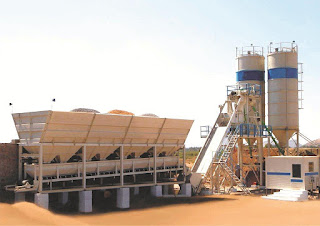For concrete manufacturers, the usage of fly ash is their big deal because they use fly ash as a component in the range of 10 to 25% for making concrete mixtures. Because of beneficial use in concrete structures, the Environmental Protection Agency (EPA) is reassessing the classification, storage, disposal and reuse of fly ash to ensure that it is properly managed to minimize potential harm to human health and the environment.
Disposed fly ash from thermal power plant is then used for various purposes. Certain classes of fly ash (wet or dry) are an important component of reinforced concrete, the best composite structural material.
Role of Fly Ash in Concrete Structures
Worldwide, concrete is used in the construction of bridges, buildings, roads and so on. Usage of concrete has never been omitted in the construction project. In simple words, concrete support our infrastructure.
More than 75% of all concrete is made with fly ash. Fly ash is specified for all concrete structures in some states. And the concrete industry is only one of the important entities using this abundant waste material. The reason, recycled fly ash goes into making concrete is it delivers measurable economic and structural benefits. Its worldwide availability, strength, durability and relatively economical cost create a constant demand for fly ash in the construction industry.
Beneficial uses of Fly ash
Fly ash is a CCP (Coal Combustion Products) possessing unique characteristics that allow it to be used ton-for-ton as a substitute for portland cement in making concrete. Through the reuse of fly ash, the GHG (green house gas) emissions associated with the production of portland cement are avoided."
Future for Fly ash
After few decades of reducing the environmental impact of portland cement production and providing a means of recycling industrial waste, fly ash and concrete stand strong together.
Environmental Benefits of Fly ash used in Concrete
Use of fly ash in concrete imparts several environmental benefits and thus it is eco-friendly. It saves the cement requirement for the same strength thus saving of raw materials such as limestone, coal etc required for manufacture of cement. Use of fly ash reduces area requirement for pond, thus saving of agricultural land.
We manufacture a wide range of construction machinery like concrete hollow block machines, fly ash brick making machine, tiles making machines, pan mixture, concrete mixture machines, CLC lightweight machine and batching plant system with high quality standard.
Disposed fly ash from thermal power plant is then used for various purposes. Certain classes of fly ash (wet or dry) are an important component of reinforced concrete, the best composite structural material.
Role of Fly Ash in Concrete Structures
Worldwide, concrete is used in the construction of bridges, buildings, roads and so on. Usage of concrete has never been omitted in the construction project. In simple words, concrete support our infrastructure.
More than 75% of all concrete is made with fly ash. Fly ash is specified for all concrete structures in some states. And the concrete industry is only one of the important entities using this abundant waste material. The reason, recycled fly ash goes into making concrete is it delivers measurable economic and structural benefits. Its worldwide availability, strength, durability and relatively economical cost create a constant demand for fly ash in the construction industry.
Beneficial uses of Fly ash
Fly ash is a CCP (Coal Combustion Products) possessing unique characteristics that allow it to be used ton-for-ton as a substitute for portland cement in making concrete. Through the reuse of fly ash, the GHG (green house gas) emissions associated with the production of portland cement are avoided."
Future for Fly ash
After few decades of reducing the environmental impact of portland cement production and providing a means of recycling industrial waste, fly ash and concrete stand strong together.
Environmental Benefits of Fly ash used in Concrete
Use of fly ash in concrete imparts several environmental benefits and thus it is eco-friendly. It saves the cement requirement for the same strength thus saving of raw materials such as limestone, coal etc required for manufacture of cement. Use of fly ash reduces area requirement for pond, thus saving of agricultural land.
We manufacture a wide range of construction machinery like concrete hollow block machines, fly ash brick making machine, tiles making machines, pan mixture, concrete mixture machines, CLC lightweight machine and batching plant system with high quality standard.


